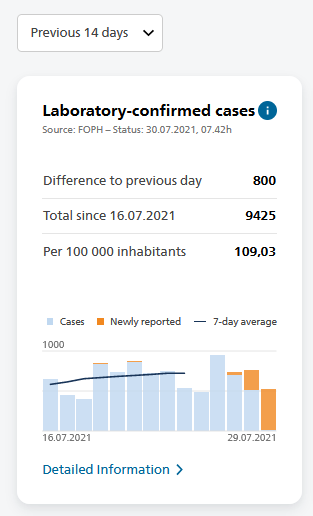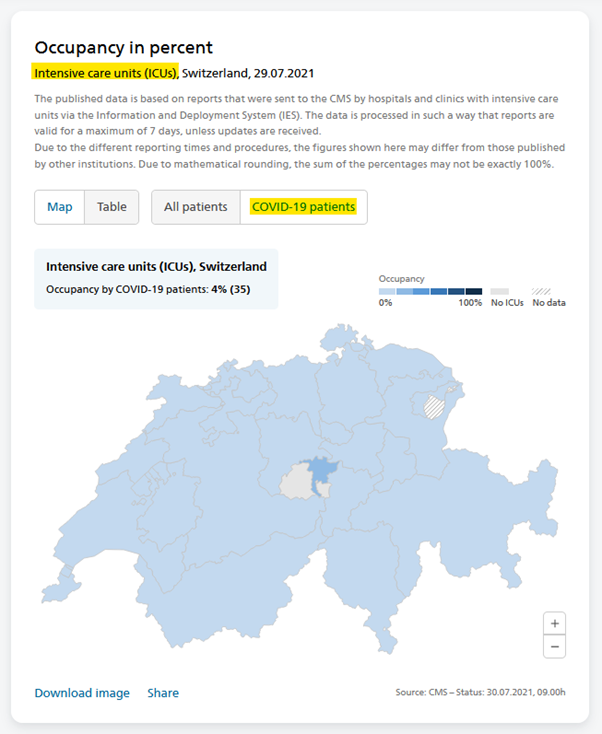COVID-19 IN SWITZERLAND. Week to 31.07.2021—rising, delta variant now 94%
Per 100K pop, total & last 2 weeks
● cases—8302 & 109 (↗️)
● in hospital—341 & 1.6 (↗️)
● deaths—121 & 0.13 (↗️)
R(e): ↘️—1.26
Vaccinations: 4.1m (48%) fully
FOPH covid19.admin.ch/en/overview?ov…
1/12



Per 100K pop, total & last 2 weeks
● cases—8302 & 109 (↗️)
● in hospital—341 & 1.6 (↗️)
● deaths—121 & 0.13 (↗️)
R(e): ↘️—1.26
Vaccinations: 4.1m (48%) fully
FOPH covid19.admin.ch/en/overview?ov…
1/12




AND FOR THE PAST FORTNIGHT, R(e) since Sep28
covid19.admin.ch/en/overview
The previous tweet shows that case numbers, hospitalisations and deaths are rising again. (Delta variant is totally dominant; vaccinations decelerating)
These are for the last fortnight:
2/12



covid19.admin.ch/en/overview
The previous tweet shows that case numbers, hospitalisations and deaths are rising again. (Delta variant is totally dominant; vaccinations decelerating)
These are for the last fortnight:
2/12




CERTIFICATES ISSUED
The Swiss certificate is now “interoperable” with the EU and EFTA certificates—QR code recognised
• Vaccinated people—4.7m
• Recovered people—112K
• Negatively tested people—827K
covid19.admin.ch/en/overview?ov… (graph is last 28 days)
3/12
The Swiss certificate is now “interoperable” with the EU and EFTA certificates—QR code recognised
• Vaccinated people—4.7m
• Recovered people—112K
• Negatively tested people—827K
covid19.admin.ch/en/overview?ov… (graph is last 28 days)
3/12

VIRUS VARIANTS detected
Delta (B.1.617) variant dominates, causing concern:
• 96.4% from 94.1% (FOPH)
• 96.42% from 96.4% (Task Force data)
Public Health Office: covid19.admin.ch/en/epidemiolog…
Science Task Force: sciencetaskforce.ch/en/nextstrain-…
4/12



Delta (B.1.617) variant dominates, causing concern:
• 96.4% from 94.1% (FOPH)
• 96.42% from 96.4% (Task Force data)
Public Health Office: covid19.admin.ch/en/epidemiolog…
Science Task Force: sciencetaskforce.ch/en/nextstrain-…
4/12




BY CANTON: LAB-CONFIRMED CASES in the past fortnight per 100K population—Overall UP from 87 to 109. Worst in Geneva pushing dark end of range up from 233 to 313
More: covid19.admin.ch/en/epidemiolog…
5/12
More: covid19.admin.ch/en/epidemiolog…
5/12

BY CANTON: LAB-CONFIRMED HOSPITALISATION in the past fortnight per 100K population—Geographically patchy, overall up from 0.94 to 1.62. Fewer cantons reporting zero. Worst in central cantons pushing dark end of range up from 3.6 to 9.9
More: covid19.admin.ch/en/epidemiolog…
6/12
More: covid19.admin.ch/en/epidemiolog…
6/12

BY CANTON: DEATHS (which lag case numbers)—up from 0.07 to 0.13. More cantons reporting no deaths. Basel City worst. Dark end of range up from 0.51 to 1.53
More: covid19.admin.ch/en/epidemiolog…
7/12
More: covid19.admin.ch/en/epidemiolog…
7/12

INTENSIVE CARE CAPACITY AND OCCUPANCY: all patients and COVID-19
Over 150 hospitals/clinics (Glarus, Appenzell Innerrhoden have no IC units)
All patients: slightly down
COVID-19 patients: low, slightly up
More: covid19.admin.ch/en/hosp-capaci…
8/12


Over 150 hospitals/clinics (Glarus, Appenzell Innerrhoden have no IC units)
All patients: slightly down
COVID-19 patients: low, slightly up
More: covid19.admin.ch/en/hosp-capaci…
8/12



R(e) ESTIMATES: national over time, cantons latest.
Down from peak but still > 1 almost everywhere. Jura exceptionally <0.8
Estimate: 1.26 nationally (from 1.31).
More: covid19.admin.ch/en/repro/val
9/12

Down from peak but still > 1 almost everywhere. Jura exceptionally <0.8
Estimate: 1.26 nationally (from 1.31).
More: covid19.admin.ch/en/repro/val
9/12


VACCINATIONS (1) VACCINES & DEMOGRAPHY
Slowing.
< 19s vaccinated
Ordered: 36m doses: Pfizer/BioNTech, Moderna, AstraZeneca, Curevac and Novavax (pop 8.6m)
Approved: Pfizer/BioNTech, Moderna, J&J (not ordered)
covid19.admin.ch/en/epidemiolog…
covid19.admin.ch/en/epidemiolog…
10/12



Slowing.
< 19s vaccinated
Ordered: 36m doses: Pfizer/BioNTech, Moderna, AstraZeneca, Curevac and Novavax (pop 8.6m)
Approved: Pfizer/BioNTech, Moderna, J&J (not ordered)
covid19.admin.ch/en/epidemiolog…
covid19.admin.ch/en/epidemiolog…
10/12




VACCINATIONS (2) OVERALL
Slowing. 48% fully vaccinated
DOSES
Delivered: 8.8m=101% (from 8.6m/100%)
Administered: 8.9m=104% (from 8.7m/101%)
PEOPLE:
Fully (2 doses): 4.19m=48% (from 3.9m/46%)
At least 1 dose = 54%
covid19.admin.ch/en/epidemiolog…
covid19.admin.ch/en/epidemiolog…
11/12



Slowing. 48% fully vaccinated
DOSES
Delivered: 8.8m=101% (from 8.6m/100%)
Administered: 8.9m=104% (from 8.7m/101%)
PEOPLE:
Fully (2 doses): 4.19m=48% (from 3.9m/46%)
At least 1 dose = 54%
covid19.admin.ch/en/epidemiolog…
covid19.admin.ch/en/epidemiolog…
11/12




LATEST: New phase started June 26
Numbers rising, delta causing concern
Still some controls eg masks indoors, indoor distancing in restaurants, travel, COVID-19 certificate needed for some events
DETAILS: bag.admin.ch/bag/en/home/kr…
SWISS INFO: swissinfo.ch/eng/covid-19_c…
12/12
Numbers rising, delta causing concern
Still some controls eg masks indoors, indoor distancing in restaurants, travel, COVID-19 certificate needed for some events
DETAILS: bag.admin.ch/bag/en/home/kr…
SWISS INFO: swissinfo.ch/eng/covid-19_c…
12/12
• • •
Missing some Tweet in this thread? You can try to
force a refresh








